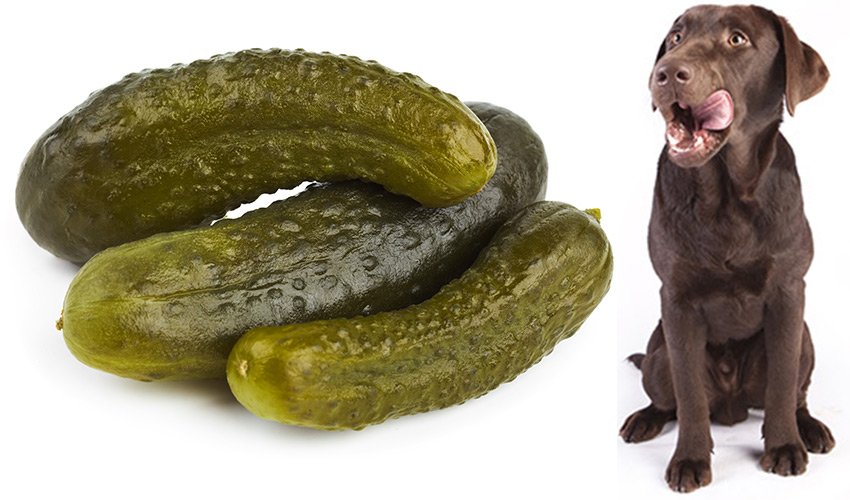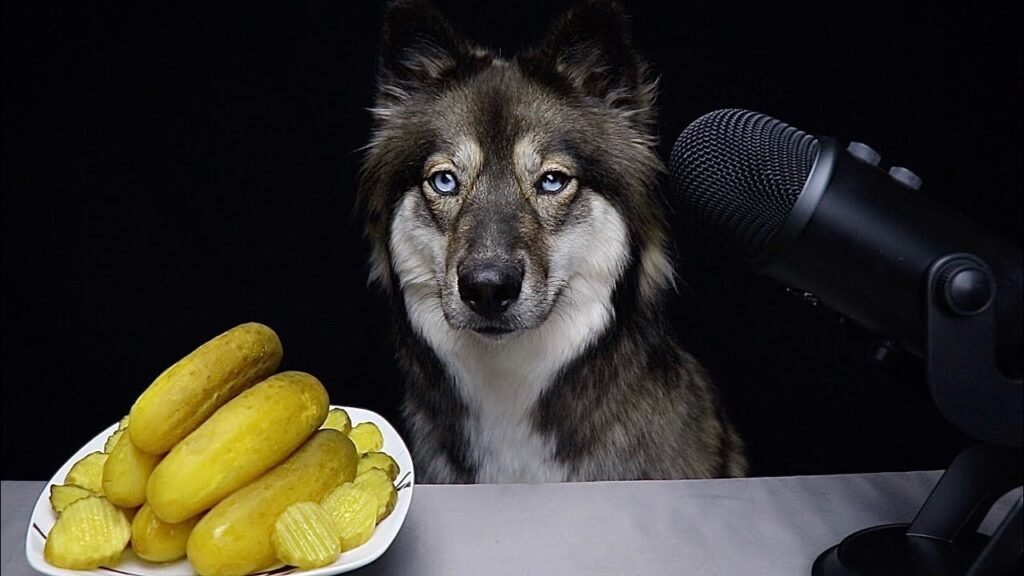Dogs are allowed to eat pickles, but it’s not advised. Although pickles aren’t harmful in and of themselves, they’re also not the healthiest option for your dog. The way pickles are made is the issue. Dogs may be harmed by pickles since they are typically flavored with different spices and marinated in saltwater brine.
On its own, pickles’ high salt level makes them a dangerous food. Compared to humans, dogs have a far lower tolerance for salt, and excessive salt consumption can cause kidney damage, sodium ion overdose, and dehydration. Furthermore, a lot of pickles contain substances like onions or garlic that are harmful to dogs and can result in major health issues including anemia.
Are Pickles Bad for Dogs?
Absolutely, pickles can be toxic to dogs, particularly if they contain harmful substances or are consumed in high numbers. The following are the most frequent risks connected to pickles:
High Salt Content: Salt overconsumption can cause vomiting, dehydration, and in extreme situations, salt poisoning. Seizures, tremors, diarrhea, and extreme thirst are signs of salt poisoning.
Toxic Spices: Garlic, onions, and other flavors that might be harmful to dogs are often used to flavor pickles. Garlic and onions, even in tiny doses, can harm your dog’s red blood cells and cause illnesses like hemolytic anemia, which can be fatal if left untreated.
Vinegar and Sugars: While sweet pickles with added sugar can lead to obesity and dental problems, vinegar-soaked pickles may cause gastrointestinal irritation in your dog.
In summary, pickles are not a healthy snack for dogs because the risks greatly exceed any possible advantages.

Is Dill Bad for Dogs?
Fresh dill, one of the most popular pickling herbs, is safe for dogs. Dill can even have some health benefits in tiny doses, such better digestion and breath refreshing. Pickles typically contain dill that has been marinated in vinegar and salt, which negates any possible health benefits and may aggravate your dog’s digestive tract.
Give your dog a tiny sprinkle of fresh dill over their meal instead of a dill pickle if you wish to give them dill. In this manner, individuals can savor the herb without the hazardous ingredients.
Can Dogs Drink Pickle Juice?
Dogs shouldn’t consume pickle juice, sorry. Pickle juice, despite its seemingly innocuous appearance, is actually concentrated saltwater combined with vinegar and spices, which can be harmful to dogs. Pickle juice use can result in potentially fatal illnesses such sodium ion overdose, severe dehydration, upset stomach, and a toxic sodium overload.
It’s best to refrain from giving your dog pickle juice completely, even if they appear interested in tasting it. The only true drink your dog needs to be hydrated and healthy is fresh water.
What To Do if Your Dog Have Pickles?
It’s generally okay if your dog inadvertently consumes a tiny piece of plain pickle, but you should keep a watchful eye out for any indications of distress. Keep an eye out for symptoms such as vomiting, diarrhea, increased thirst, or fatigue. Call your veterinarian right away if your dog eats a lot of pickles or pickles that have been seasoned with onions or garlic.
To help wash away extra salt, make sure your dog drinks lots of water. Seek emergency veterinarian attention as soon as your dog exhibits severe symptoms such as tremors, breathing difficulties, or seizures. These could indicate garlic toxicity or sodium ion poisoning.

Conclusion
So, can dogs have pickles? Even while your dog probably won’t suffer much from a tiny nibble of an unseasoned pickle, it’s not a suggested or healthful treat. Because of their high sodium content and the possibility of harmful ingredients like onions and garlic, pickles are not a healthy food for dogs. It’s recommended to give your pet safer, healthier snacks like carrots, cucumber slices, or dog-friendly fruits instead of pickles.
If your dog does inadvertently eat a pickle, keep a cool head, keep an eye on their symptoms, and contact your veterinarian if you’re worried. Always put their long-term health first, and select snacks that will enhance rather than jeopardize their wellbeing. And also find more useful information about pet cares on Cooper Pet Cares.
FAQs
Can dogs eat bread and butter pickles?
No, bread and butter pickles are not suitable for dogs. These pickles are sweetened with sugar, which can contribute to obesity and other health issues like diabetes. Additionally, they still contain high levels of salt, making them a poor choice for a dog’s diet.
What should I do if my dog drinks pickle juice?
If your dog drinks pickle juice, it’s important to offer them plenty of fresh water to help dilute the salt and vinegar in their system. Keep an eye on them for signs of stomach upset or salt poisoning, such as vomiting, diarrhea, lethargy, or excessive thirst. If your dog shows any concerning symptoms, contact your veterinarian right away.
Can dill pickles be given to dogs?
Dill pickles are not recommended for dogs because of the high salt content and potential for harmful seasonings like garlic or onions. While fresh dill itself is safe, the pickling process introduces ingredients that can upset your dog’s stomach or cause more serious health problems.
Are there any health benefits to giving dogs pickles?
No, there are no significant health benefits to feeding pickles to dogs. The high sodium content and potential for toxic ingredients make them an unsafe snack. If you’re looking for a healthy, crunchy treat, fresh vegetables like cucumber slices, carrots, or apples (without seeds) are much safer options.
Can puppies eat pickles?
No, puppies should not eat pickles. Puppies are even more sensitive to sodium and harmful ingredients than adult dogs, and their developing bodies are not equipped to handle the high salt levels found in pickles. Stick to puppy-safe treats that support their growth and health.